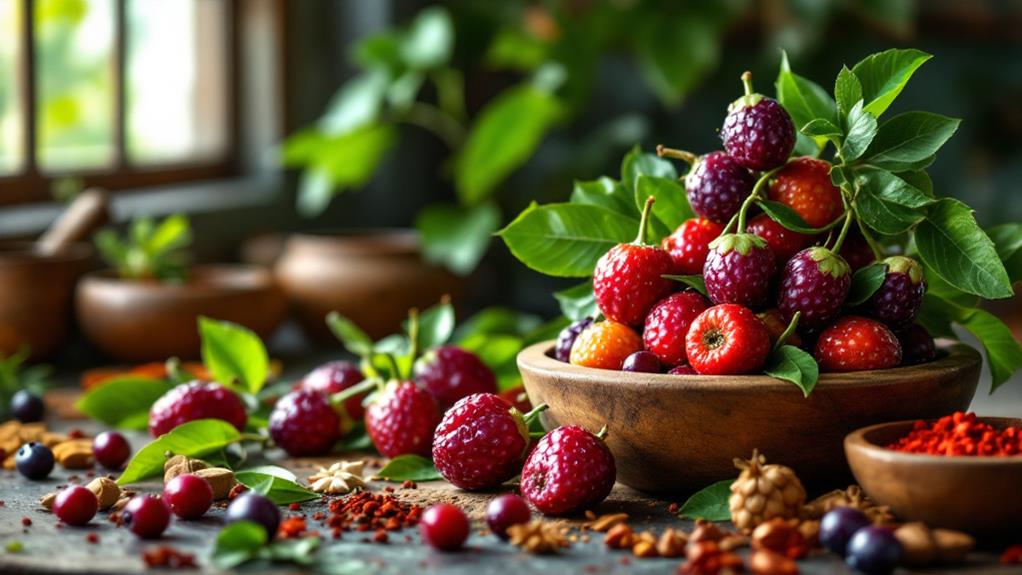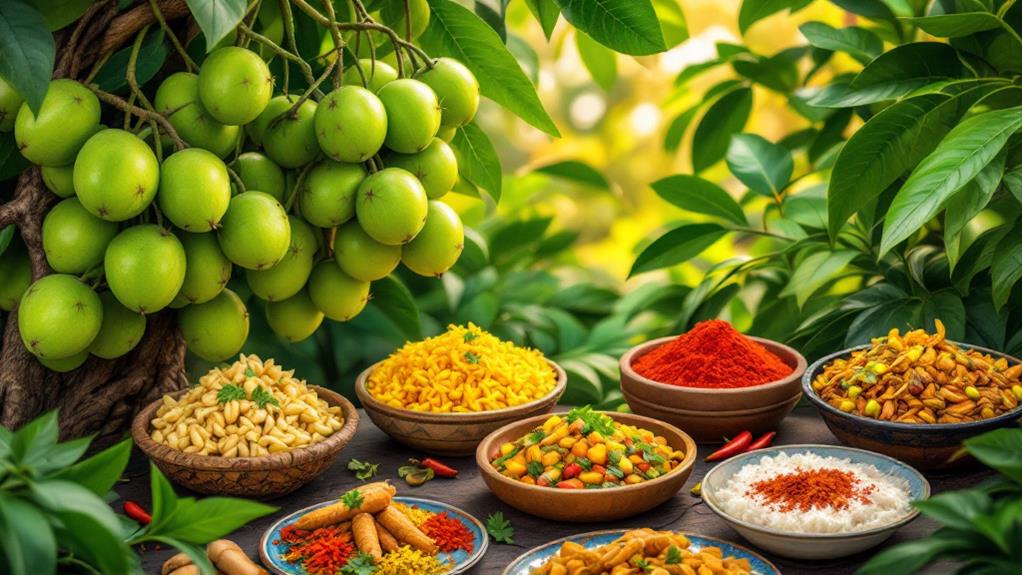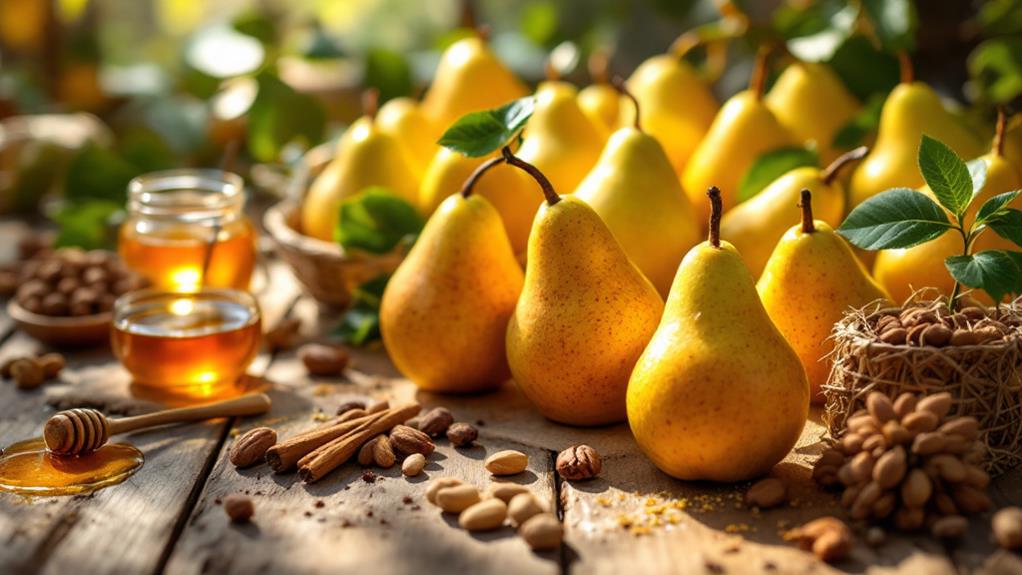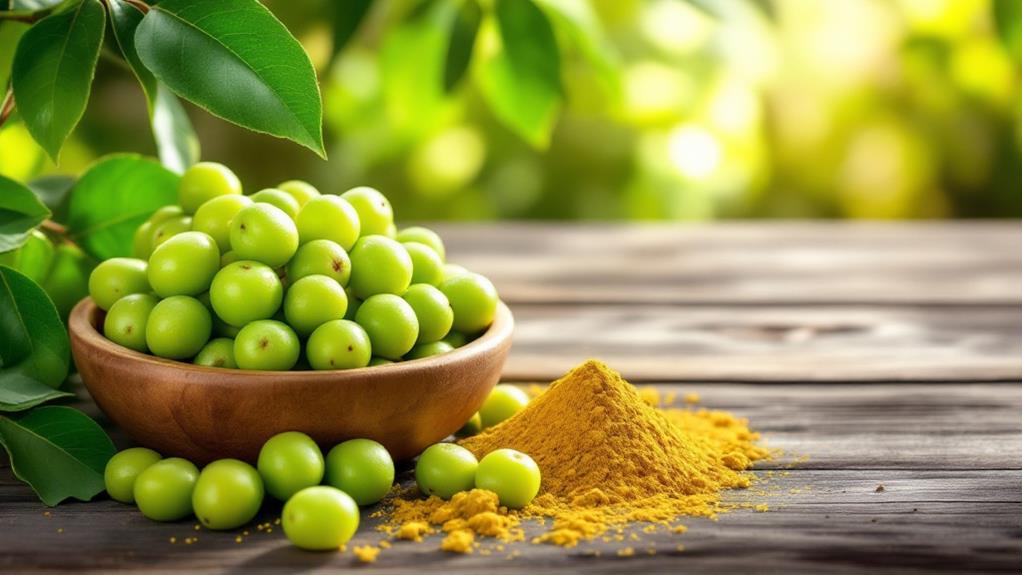Bilimbi: An Overview of Health Benefits and Culinary Uses

You'll find bilimbi to be a low-calorie fruit brimming with vitamin C, antioxidants, and crucial minerals like calcium and potassium. It bolsters your immune system, supports bone health, and aids digestion. In the kitchen, bilimbi shines as a souring agent in curries and soups or brings a punch of flavor when raw with salt and chilies. It's a traditional remedy for blood sugar and skin issues in Southeast Asia. However, moderation is key due to its oxalic acid content, which can pose risks for some. There's much to investigate about this fascinating fruit and its rich culinary uses.
Nutritional Composition
When you plunge into the nutritional composition of bilimbi, you'll find it's a powerhouse of health benefits packed into a low-calorie package. With just 16 calories per 100 grams, bilimbi is an ideal fruit for those looking to maintain a healthy diet. Its rich vitamin C content greatly improves your immune function, helping you fight off colds and other illnesses. Furthermore, vitamin C plays an important role in maintaining skin health, promoting collagen production, and keeping your skin youthful.
Bilimbi doesn't stop there. It's loaded with important minerals like calcium and potassium. These minerals are essential for maintaining bone density and supporting heart health, ensuring your body functions at its best. The antioxidant properties found in bilimbi, thanks to flavonoids, tannins, and terpenes, help combat oxidative stress, protecting your cells from damage.
Moreover, bilimbi's high water content aids in hydration, while its dietary fiber promotes digestive health by supporting regular bowel movements. This unique fruit showcases a nutrient synergy, combining vitamins, minerals, and phytochemicals to improve your overall well-being. So, incorporating bilimbi into your diet isn't just tasty; it's a step toward better health.
Health Benefits
While examining bilimbi's impressive nutritional profile, it's clear this small fruit offers significant health benefits. Packed with vitamin C, bilimbi is a powerhouse for enhancing your immune system. By strengthening your body's defenses, it helps combat seasonal illnesses and keeps you feeling your best. Plus, the vitamin C in bilimbi promotes collagen production, which is crucial for maintaining healthy, youthful skin.
If you're managing diabetes, bilimbi might be your new best friend. Its high fiber and flavonoid content helps regulate blood sugar levels, making it a beneficial supplement to your diet. You can drink bilimbi fruit juice to enjoy these benefits conveniently.
Bilimbi is also high in antioxidants, which exhibit DPPH radical scavenging activity. This means they neutralize free radicals, protecting you from oxidative stress and supporting comprehensive health. Furthermore, the calcium and vital minerals found in bilimbi contribute to bone health and can help prevent osteoporosis.
Bilimbi's anti-inflammatory properties are another boon. They may help reduce swelling and pain, providing relief for conditions like rheumatism and skin irritations. By incorporating bilimbi into your routine, you're embracing a natural way to support your health.
Culinary Applications

Although often overlooked, bilimbi offers a delightful tang that can transform your dishes. You can use this fruit as a souring agent in assorted culinary applications, adding a unique flavor to curries, soups, and dals. It's especially popular in Southeast Asian cuisine, where its tangy essence enhances traditional recipes. Try using bilimbi in your prawn curry, as it's a staple in Goan cuisine, blending sweet and sour notes that showcase the fruit's versatility.
If you're feeling adventurous, enjoy bilimbi raw, sprinkled with salt and bird's eye chilies. This combination balances its sourness, making it a lively enhancement to salads and snacks. Pickling bilimbi is another fantastic way to preserve and intensify its flavor. Once pickled, it becomes a zesty condiment or side dish that can spice up ordinary meals.
Don't forget about bilimbi juice! Harnessing the fruit's high vitamin C content, bilimbi juice offers a invigorating and nutritious beverage option. You can blend it into smoothies or enjoy it on its own. By incorporating bilimbi into your culinary repertoire, you can discover exciting flavors and welcome this underappreciated fruit's potential.
Traditional Uses
In numerous traditional practices, bilimbi has found its place as a multifaceted remedy, thanks to its rich antioxidant and astringent properties. You can use bilimbi fruits and leaves to treat a range of ailments. For instance, a decoction made from bilimbi is highly recommended for controlling blood sugar levels, making it a valuable natural remedy for managing diabetes symptoms. By incorporating this into your routine, you may help stabilize your blood sugar levels more naturally.
Additionally, if you're dealing with skin issues like rheumatism or pesky insect bites, a historical remedy involves mashing young stems and bilimbi leaves with garlic for a topical application. This mixture has been traditionally applied to the affected areas, offering relief and promoting healing. Furthermore, bilimbi leaves combined with garlic can also be used as a paste to address mumps, showcasing the plant's versatility in treating different conditions.
Moreover, bilimbi's rich calcium content makes it a traditional choice for strengthening bones and maintaining comprehensive bone health. So, regardless of whether you're dealing with blood sugar concerns, skin irritations, or bone health, bilimbi offers a natural alternative worth considering in your traditional wellness practices.
Cultural Significance

From its culinary to medicinal roles, bilimbi holds a profound cultural significance in Southeast Asian communities. You'll find that this fruit, also known as "bimbli," isn't just a staple in the kitchen but a symbol of cultural heritage. In many regions, its distinct sour flavor improves traditional dishes, like the cherished prawn and bimbli curry in Goan cuisine. Such recipes aren't just about taste; they reflect the deep-rooted traditions and the cultural importance of using local ingredients.
Bilimbi also plays a crucial role beyond the dinner table. Historically, it's been used in folk medicine, addressing multiple health problems, which further cements its place in cultural practices. Communities emphasize eating bimbli as part of a nutritious diet, showcasing its benefits for health and well-being.
Efforts to revive and celebrate traditional recipes featuring bilimbi are growing. These initiatives aim to highlight the fruit's adaptability and promote sustainability by using indigenous ingredients. By doing so, there's a renewed appreciation for the cultural heritage that bilimbi represents. As you investigate these culinary traditions, you're not just tasting history; you're participating in a lively cultural narrative.
Safety Considerations
While bilimbi's cultural significance and benefits are remarkable, it's vital to evaluate its safety implications. Bilimbi juice, while invigorating, contains high levels of oxalic acid. This compound can pose considerable health risks, particularly if consumed in large amounts. Excessive intake of oxalic acid can lead to acute kidney failure, a serious condition that has been reported in regions like Kerala, India. In these cases, kidney biopsies found acute tubular necrosis caused by calcium oxalate crystals, highlighting the dangers of overconsumption.
To enjoy bilimbi safely, moderation is key. You should be mindful of how much bilimbi juice you're drinking and aim for a balanced diet to avoid any complications from its oxalate content. If you have a history of kidney stones or other renal issues, it's critical to consult a healthcare provider before including bilimbi in your diet. They can offer guidance on safe consumption levels based on your health history.




